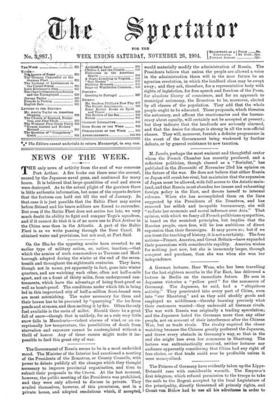On the Sha-ho the opposing armies have reverted to an
earlier type of military action, or, rather, inaction,—that which the armies of such commanders as Turenne and Marl- borough adopted during the winter at the end of the seven- teenth and throughout the eighteenth centuries. They have, though not in name, yet apparently in fact, gone into winter quarters, and are watching each other, often not half-a-mile apart, and on a front of thirty miles, from underground can- tonments, which have the advantage of being frost-proof as well as bomb-proof. The conditions under which life is being led in this improvised city of half-a-million frost-bound men are most astonishing. The water necessary for them and their horses has to be procured by " quarrying " the ice from ponds and streams, and then melting it by fire. Often the only fuel available is the roots of millet. Should there be a great fall of snow—though that is unlikely, for as a rule very little snow falls in Manchuria—violent storms of wind, or an ex- ceptionally low temperature, the possibilities of death from starvation and exposure cannot be contemplated without a thrill of horror. Any of these causes might make it im- possible to feed this great city of war.














































